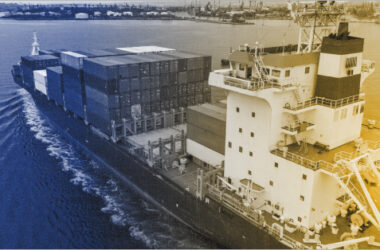Intermediate storage in Marine Insurance is a crucial aspect of the industry that is often overlooked. Marine Insurance Policies typically cover goods from the moment they leave the point of origin until they reach their destination. However, when goods are placed in intermediate storage, they are not technically in transit anymore, and therefore may not be covered by the original policy. This is where intermediate storage insurance comes in, providing coverage for the goods while they are in storage and ensuring that any losses or damages are covered.
Both shippers and insurers need to understand the implications of intermediate storage and the need for appropriate insurance coverage. Failure to properly insure goods during intermediate storage can lead to significant financial losses and delays in delivery. As such, it is crucial for all parties involved to be aware of the risks and take the necessary precautions to protect against them.
Intermediate Storage in Marine Insurance
Intermediate storage in Marine Insurance refers to the temporary storage of goods during the logistics process. This type of storage is typically used when goods need to be transferred from one mode of transportation to another, such as from a ship to a truck or train. Intermediate storage can also be used when there is a delay in transportation or when goods need to be consolidated or unconsolidated.
The scope of intermediate storage in Marine Insurance can vary depending on the specific needs of the logistics chain. It can range from a few hours to several weeks or even months. The duration of intermediate storage will depend on factors such as the type of goods being transported, the transportation mode, and the location of the storage facility. Intermediate storage coverage is a type of Marine Insurance that provides protection for goods or cargo that are temporarily stored at a port or terminal. It protects the cargo from damage or loss while it is being stored, and it is typically purchased by importers or exporters who need to store their goods for a short period of time before they are transported to their destination.
Role of Intermediate Storage in Logistics Chain
Intermediate storage plays a crucial role in the logistics chain. It enables the smooth transfer of goods between different modes of transportation, ensuring that goods are delivered to their destination on time and in good condition. It also allows for the consolidation and deconsolidation of goods, which can help reduce transportation costs.
In terms of Marine Insurance, intermediate storage is an important consideration. Goods may be at a higher risk of damage or loss during intermediate storage due to the increased handling and potential for theft. As such, shippers need to ensure that their goods are adequately insured during this period.
Inclusions in Intermediate Storage Cover in Marine Insurance
Marine Insurance Policies, including intermediate storage cover, can vary among different insurers and policies. Typically, an intermediate storage cover may include the following coverages:
· Inland Transit Coverage: Protection for goods during the transportation phase from the port to an intermediate storage facility.
· Warehousing Coverage: Coverage for goods while they are stored in an intermediate storage facility or warehouse.
· Loading and Unloading Coverage: Protection during the loading and unloading of goods at various stages of transportation.
· Customs Duty and Charges: Coverage for customs duties and charges incurred during the intermediate stages of transportation and storage.
· Storage Extension Coverage: Extension of coverage for goods stored in the warehouse beyond a specified period.
· Transshipment Coverage: Protection during the transshipment of goods from one mode of transportation to another.
· Packing and Repacking Coverage: Coverage for damages that may occur during packing and repacking of goods.
Depending on the specific needs of the insured, additional coverages or special conditions may also be included in the policy. It’s crucial for businesses and individuals to carefully review the terms and conditions of their Marine Insurance Policy, including the intermediate storage cover, to ensure that it meets their specific requirements. Additionally, consulting with BimaKavach experts can help understand the nuances of the coverage and obtaining a policy that aligns with the insured’s needs.
What is excluded from Intermediate Storage Cover in Marine Insurance?
While the specific exclusions can vary depending on the insurance company and policy terms, here are some common exclusions that might apply to intermediate storage cover in Marine Insurance in India:
1. War and Strikes: Losses or damages caused by war, civil war, insurrections, or strikes may be excluded.
2. Nuclear Risks: Damage or loss caused by nuclear events may be excluded from coverage.
3. Inherent Vice or Nature of Goods: Damage that arises from the nature of the goods themselves or their inherent characteristics may be excluded.
4. Insufficient Packing: Losses resulting from inadequate or insufficient packing of the goods may not be covered.
5. Delay, Loss of Market or Consequential Loss: Economic losses, such as loss of market, delay in delivery, or other consequential losses, may be excluded.
6. Unseaworthiness of Vessel: Losses resulting from the unseaworthiness of the vessel or other conveyance may be excluded.
7. Illegal or Prohibited Goods: Losses related to goods that are illegal or prohibited may not be covered.
8. Inadequate Labels or Markings: Losses due to the absence of proper labels or markings on the goods may be excluded.
9. Negligence: Losses resulting from the insured’s own negligence or failure to take reasonable precautions may be excluded.
10. Government Actions: Losses caused by actions taken by government authorities, such as confiscation or expropriation, may be excluded
It’s crucial for policyholders to carefully read and understand the exclusions specified in their Marine Insurance Policy. If there are specific concerns or if additional coverage is needed, discussions with the insurance provider or broker can help clarify the terms and potentially tailor the policy to better suit the insured’s needs. Insurance policies can be complex documents, and professional advice is often beneficial in ensuring comprehensive coverage.
Duration of Coverage for Intermediate Storage in Marine Insurance
The duration of coverage for intermediate storage in Marine Insurance can vary depending on the policy terms and conditions. Some policies may provide coverage for a specific period, such as 30, 60, or 90 days, while others may provide coverage for a longer period, such as six months or a year.
It is important to carefully review the duration of coverage specified in the policy terms and conditions to ensure that you have adequate protection for your goods during the storage period. If you need to extend the storage period, you may need to purchase additional coverage or negotiate an extension with your insurer.
Risk Assessment and Management of Intermediate Storage
· Identification of Risks
Before any intermediate storage is handled in Marine Insurance, it is important to identify the risks involved. This includes risks associated with the storage location, the type of cargo being stored, and the storage period.
The location of the storage facility is a crucial factor in risk assessment. The storage facility should be in a secure location that is protected from natural disasters, theft, and vandalism. The storage facility should also be easily accessible to reduce the risk of damage during transportation.
The type of cargo being stored is another important factor to consider. The cargo should be compatible with the storage facility and should not pose a risk to the environment or nearby properties. For example, hazardous materials should be stored in a facility that is specifically designed for such materials.
Finally, the storage period is an important factor to consider. The longer the storage period, the greater the risk of damage or loss. It is important to ensure that the storage facility is equipped with the necessary measures to prevent damage or loss during the storage period.
· Risk Mitigation Strategies
Once the risks have been identified, appropriate risk mitigation strategies should be put in place. These strategies include:
- Adequate insurance coverage: The cargo should be insured for the full value of the goods being stored. This will provide financial protection in the event of damage or loss.
- Regular inspections: Regular inspections of the storage facility and the cargo should be carried out to identify any potential risks and to ensure that the cargo is being stored correctly.
- Security measures: The storage facility should have adequate security measures in place to prevent theft, vandalism, and unauthorised access.
- Environmental protections: If the cargo being stored is hazardous, appropriate environmental protections should be put in place to prevent damage to the environment.
Conclusion:
Navigating through the complexities of intermediate storage in Marine Insurance is crucial for businesses involved in marine trade. Understanding the nuances of this coverage, including in-transit protection, warehousing, and associated risks, is paramount to ensuring a smooth and secure passage for your goods. From inland transit to warehousing, from loading docks to customs checkpoints, each leg of the journey presents its own set of challenges and opportunities.
Frequently Asked Questions
1. How is the cost for intermediate storage in Marine Insurance determined?
The cost for intermediate storage in Marine Insurance is determined based on several factors, including the value of the cargo, the duration of storage, the location of the storage facility, and the level of risk associated with the storage.
2. What does the term ‘sum insured’ signify regarding intermediary storage?
The term ‘sum insured’ regarding intermediary storage refers to the maximum amount that an insurer will pay out in the event of loss or damage to the cargo during the storage period.
3. Can you explain the meaning of ‘special storage risk insurance’?
‘Special storage risk insurance’ is a type of Marine Insurance that provides coverage for cargo that is stored in a location that is high-risk, such as a war zone or an area prone to natural disasters.
4. How does the cargo termination of storage in transit clause affect Marine Insurance coverage?
The cargo termination of storage in transit clause is a provision in Marine Insurance Policies that specifies the conditions under which coverage for intermediate storage will terminate. This clause typically states that coverage will end once the cargo is loaded onto the next mode of transportation for onward delivery.








